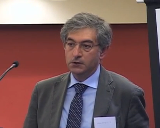Studying at the University of Verona
Here you can find information on the organisational aspects of the Programme, lecture timetables, learning activities and useful contact details for your time at the University, from enrolment to graduation.
Academic calendar
The academic calendar shows the deadlines and scheduled events that are relevant to students, teaching and technical-administrative staff of the University. Public holidays and University closures are also indicated. The academic year normally begins on 1 October each year and ends on 30 September of the following year.
Course calendar
The Academic Calendar sets out the degree programme lecture and exam timetables, as well as the relevant university closure dates..
| Period | From | To |
|---|---|---|
| Sem. 1A | Oct 1, 2009 | Nov 15, 2009 |
| Sem. 1B | Nov 16, 2009 | Jan 17, 2010 |
| Sem. 2A | Feb 22, 2010 | Apr 18, 2010 |
| Sem. 2B | Apr 19, 2010 | Jun 6, 2010 |
| Session | From | To |
|---|---|---|
| Sessione invernale (A.A. 2008-2009) | Jan 18, 2010 | Feb 21, 2010 |
| Sessione estiva (esami sospesi dal 6 al 9 luglio) | Jun 7, 2010 | Jul 31, 2010 |
| Sessione autunnale | Sep 1, 2010 | Sep 30, 2010 |
| Session | From | To |
|---|---|---|
| Sessione estiva - 1° Appello | May 28, 2010 | May 28, 2010 |
| Sessione estiva - 2° Appello | Jul 9, 2010 | Jul 9, 2010 |
| Sessione autunnale - 1° Appello | Oct 22, 2010 | Oct 22, 2010 |
| Sessione autunnale - 2° Appello | Dec 17, 2010 | Dec 17, 2010 |
| Sessione invernale | Mar 18, 2011 | Mar 18, 2011 |
| Period | From | To |
|---|---|---|
| Festa di Ognissanti | Nov 1, 2009 | Nov 1, 2009 |
| Festa dell'Immacolata Concezione | Dec 8, 2009 | Dec 8, 2009 |
| Vacanze Natalizie | Dec 21, 2009 | Jan 6, 2010 |
| Vacanze Pasquali | Apr 2, 2010 | Apr 6, 2010 |
| Festa della Liberazione | Apr 25, 2010 | Apr 25, 2010 |
| Festa dei lavoratori | May 1, 2010 | May 1, 2010 |
| Festività del Santo Patrono di Verona S.Zeno | May 21, 2010 | May 21, 2010 |
| Festa della Repubblica | Jun 2, 2010 | Jun 2, 2010 |
| Vacanze Estive | Aug 9, 2010 | Aug 15, 2010 |
Exam calendar
Exam dates and rounds are managed by the relevant Humanistic Studies Teaching and Student Services Unit.
To view all the exam sessions available, please use the Exam dashboard on ESSE3.
If you forgot your login details or have problems logging in, please contact the relevant IT HelpDesk, or check the login details recovery web page.
Should you have any doubts or questions, please check the Enrollment FAQs
Academic staff
 stefania.annechini@univr.it
stefania.annechini@univr.it
Berra Michela
 avv.michelaberra@libero.it
avv.michelaberra@libero.it
 0161602819
0161602819
 nicoletta.bersani@univr.it
nicoletta.bersani@univr.it
Bisleri Carla
Chinato Maria Grazia
 machinat@libero.it
machinat@libero.it
 mario.dalcorso@univr.it
mario.dalcorso@univr.it
 roberto.dallachiara@univr.it
roberto.dallachiara@univr.it
 francesca.feliziani@univr.it
francesca.feliziani@univr.it
 laura.fontecedro@univr.it
laura.fontecedro@univr.it
Forato Gianna
 gianna.forato@univr.it
gianna.forato@univr.it
Frighetto Roberta
 roberta.frighetto@univr.it
roberta.frighetto@univr.it
 annamaria.giarola@univr.it
annamaria.giarola@univr.it
 raffaele.morello@univr.it
raffaele.morello@univr.it
 mauro.niero@univr.it
mauro.niero@univr.it
Rigoni Antonella
 maria.soldati@univr.it
maria.soldati@univr.it
Study Plan
The Study Plan includes all modules, teaching and learning activities that each student will need to undertake during their time at the University.
Please select your Study Plan based on your enrollment year.
1° Year
| Modules | Credits | TAF | SSD |
|---|
Un insegnamento a scelta tra i seguenti2° Year activated in the A.Y. 2010/2011
| Modules | Credits | TAF | SSD |
|---|
3° Year activated in the A.Y. 2011/2012
| Modules | Credits | TAF | SSD |
|---|
| Modules | Credits | TAF | SSD |
|---|
Un insegnamento a scelta tra i seguenti| Modules | Credits | TAF | SSD |
|---|
| Modules | Credits | TAF | SSD |
|---|
Legend | Type of training activity (TTA)
TAF (Type of Educational Activity) All courses and activities are classified into different types of educational activities, indicated by a letter.
Legislation and administration of social services (2010/2011)
Teaching code
4S02351
Credits
6
Language
Italian
Scientific Disciplinary Sector (SSD)
IUS/10 - ADMINISTRATIVE LAW
The teaching is organized as follows:
Lezione - prof. Duret
Lezione - prof.ssa Berra
Credits
2
Period
Sem. 2B
Academic staff
Michela Berra
Learning outcomes
Module I:
The course sets social work in the framework of changes taking place in the organization of italian public administration and its relationships with citizens especially according to the principle of subsidiarity. The main goal is offer to students the instruments to tackle and to master the basics of the discipline of administrative law as an introduction to the specific items dealt with in Part II.
Module II:
The Second Form of the course will instead concern the public powers and the role of private actors in the system outlined by Act No. 328, 2000 and related legislation of the sector, particularly regarding how to manage social work, the types of social benefits and access and enforceability thereof. After a brief introduction to the topics which are the subject of the course, teaching activities will be organized with the active participation of students. They will present an oral report on the matters on the program in order to verify the proper learning of the concepts involved and their legal language. These reports, if positively evaluated, can be relied on examination, through the attribution of special "didactic credits".
Program
Module I: Social work in a changing pattern of administration.
1.The italian public administration in the constitutional framework.
2.Basics of administrative organization.
3.Basics of administrative procedure and administrative acts.
4.Basic principles of administrative justice.
Module II: Relevant public and private role in the integrated system of interventions and social work.
1.Social work and welfare model outlined by Act No. 328, 2000.
2.The method for managing social work.
3.The functions of individuals in the integrated system of interventions and social work.
4.Social benefits.
5.Social Secretariat.
Textbooks:
Module I:
• BASSI F., Lezioni di diritto amministrativo, Giuffrè, Milano, ultima edizione.
Module II:
• MORZENTI PELLEGRINI R. (a cura di), Manuale di legislazione dei servizi sociali, Giappichelli, Torino, 2008, limited to chapters I, IV, V, VI and VII.
Examination Methods
Module I:
Oral examination.
Module II:
Written exam.
Type D and Type F activities
Modules not yet included
Career prospects
Module/Programme news
News for students
There you will find information, resources and services useful during your time at the University (Student’s exam record, your study plan on ESSE3, Distance Learning courses, university email account, office forms, administrative procedures, etc.). You can log into MyUnivr with your GIA login details: only in this way will you be able to receive notification of all the notices from your teachers and your secretariat via email and soon also via the Univr app.
Student mentoring
Linguistic training CLA
Gestione carriere
Practical information for students
Documents
| Title | Info File |
|---|---|
|
|
pdf, it, 325 KB, 02/05/23 |
|
|
pdf, it, 212 KB, 02/05/23 |
|
|
pdf, it, 131 KB, 02/05/23 |
Graduation
Documents
| Title | Info File |
|---|---|
|
|
pdf, it, 99 KB, 13/10/23 |
|
|
pdf, it, 101 KB, 10/04/24 |
List of theses and work experience proposals
| theses proposals | Research area |
|---|---|
| Proposta tesi | Various topics |
Assistente Sociale
Comune e Università di Verona collaborano per la formazione alla professione di assistente sociale.
Professione Assistente Sociale
Pagina aggiornata il 18/1/2022
Stage e Tirocini
Le attività̀ di tirocinio degli studenti si svolgono presso strutture esterne, convenzionate con l’Università degli Studi di Verona ai sensi delle vigenti disposizioni in materia. Nelle strutture esterne gli studenti svolgono le attività di tirocinio sotto la responsabilità di un assistente sociale (Tutor-supervisore), appartenente a dette strutture, coordinato a sua volta dal responsabile del tirocinio presso il Corso di Studio.
In assenza di un assistente sociale, operante nella struttura esterna, il Collegio didattico, per quanto di competenza, decide, su proposta dei responsabili del tirocinio, in ordine alle condizioni per l’effettuazione o la prosecuzione delle attività di tirocinio degli studenti interessati. Le attività di tirocinio sono obbligatorie per almeno 450 ore.
Il Collegio didattico, in deroga alle disposizioni del presente articolo, può consentire a studenti che si trovino in particolari condizioni, in specie se disabili, lavoratori o impegnati in organismi collegiali dell’Università degli Studi di Verona, di non ottemperare in parte all’obbligo di frequenza alle attività di tirocinio, predisponendo forme alternative di tirocinio, anche tramite supporti telematici e multimediali interattivi.
I responsabili delle attività di tirocinio presso il Corso di Studio, anche avvalendosi di appositi collaboratori o tutori esterni, accertano la presenza degli studenti presso le rispettive strutture. A tal fine utilizzano un apposito libretto di frequenza per ciascuno studente.
Al termine dell’attività di tirocinio, lo studente deve presentare una relazione scritta al responsabile di tale attività presso il Corso di Studio. Lo studente elabora la relazione scritta, controfirmata dal Tutor-supervisore. La relazione finale viene valutata dal responsabile del tirocinio presso il Corso di Studio e deve tenere conto degli obiettivi prefissati dal Collegio didattico.
La valutazione viene attribuita al tirocinio nel seguente modo: sufficiente = 1; buono = 2; ottimo = 3; eccellente = 4 e verrà aggiunta alla media dei voti del curriculum al momento della discussione della tesi.
Gli Uffici della Direzione Didattica e Servizi agli Studenti predispongono la documentazione necessaria allo svolgimento delle attività̀ di tirocinio, comprese attestazioni e certificazioni.
Nel caso in cui lo studente partecipi a programmi di mobilità internazionale, le attività̀ di tirocinio vengono regolamentate come segue:
A – Lo studente svolge il Tirocinio presso la sede estera.
Se lo studente svolge il Tirocinio all’estero si ritengono assolti gli obbligo relativi al Laboratorio se:
- - lo studente aggiorna il proprio docente/tutor con brevi relazioni mensili da inviare mezzo mail, sull’andamento del lavoro svolto presso la sede estera;
- - produce una relazione finale completa del tirocinio svolto.
La valutazione finale del laboratorio di guida al tirocinio sarà̀ effettuata da parte del tutor del laboratorio sulla base della relazione dello studente tenendo conto della eventuale valutazione da parte del supervisore estero.
B – Lo studente non svolge il Tirocinio presso la sede estera.
Se lo studente non svolge il Tirocinio nella sede estera e lo deve fare al rientro:
lo studente effettua uno/due incontri individuali iniziali con il docente/tutor in cui predisporre quanto necessita per l’avvio del tirocinio e nei quali verranno forniti materiali, griglie ed eventuali testi di riferimento;
invia brevi relazioni mensili sull’andamento del tirocinio che sarà svolto in Italia al di fuori del periodo in cui si tiene il laboratorio di guida al tirocinio;
produce la relazione finale completa del tirocinio svolto”.
- Tutte le informazioni in merito agli stage per futuri studenti sono disponibili alla pagina Stage e tirocini.
- Tutte le informazioni in merito agli stage per studenti iscritti sono pubblicate in MyUnivr - come fare per - stage e tirocini.
- Tutte le informazioni in merito agli stage per le aziende sono disponili alla pagina Stage e tirocini per azienze.














